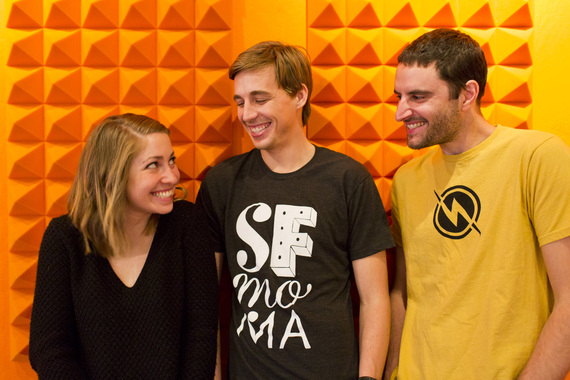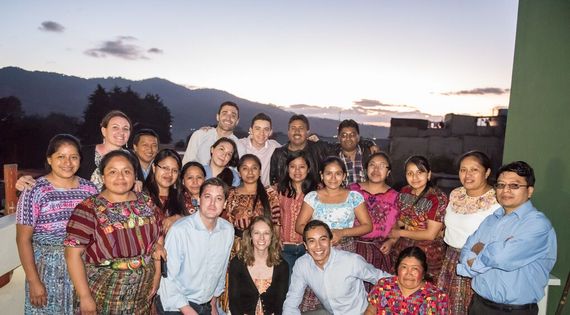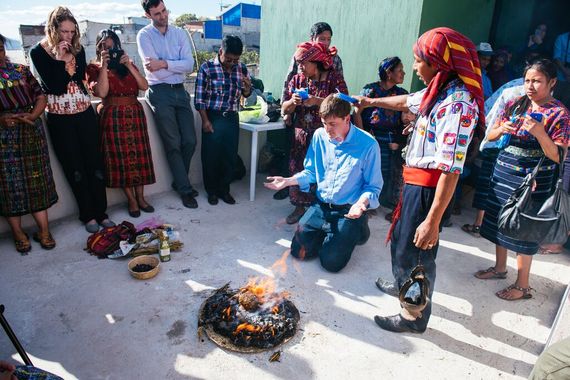Startup Insider is a series of articles with the goal of helping aspiring founders and entrepreneurs understand the ins and outs of starting a startup. We hope to dig deeper and showcase stories, advice and lessons from founders, investors and other key players in the growing startup ecosystem all over the world. You can sign up to stay up to date with this series here.
Nonprofits have gotten a negative connotation in the last few years as unsustainable and inefficient. But a few nonprofits have decided to integrate the latest technologies in becoming more efficient and sustainable. These nonprofits that decide to do so end up growing like a startup, while still keeping to their core mission as nonprofits.
One nonprofit that has shown that applying the startup and technology mindset in this space can go a long way is Watsi, a global crowd-funding platform for medical treatments that connects donors with people in need of medical care.
100% of every donation made through Watsi goes directly to funding the healthcare of the patient you choose. When you go through Watsi's website, you can view the profiles of all the patients they support and the story of each of these patients. Since their launch back in August 2012, Watsi has gone on to raise over $5M, helping fund the healthcare of over 5000 patients. Watsi is also the first non-profit to get accepted into top accelerator Y Combinator.
 The Founding Team of Watsi (Grace, Chase and Jesse) at Y Combinator (Photo Credits: Lisa Wiseman)
The Founding Team of Watsi (Grace, Chase and Jesse) at Y Combinator (Photo Credits: Lisa Wiseman)
Through a mutual connection, I got the chance to interview Grace Garey, the cofounder of Watsi. Grace shared with me how she first got interested in nonprofits, how Watsi started, lessons she's learned and more.
"How can I help?"
Growing up, Grace would hear stories from around the world about people who did not have a lot of the basic necessities she had when she was growing up. This itch and feeling she would get when watching and reading about these news stories from developing countries made her feel responsible for finding a way to help these people. The only problem? She didn't know how she could help. But college would come and she started to find ways to volunteer and get involved.
She shared, "Once I got into college, I started traveling and looking for opportunities to help. In junior year, I took some time off school to live in Ghana, took classes in the university of Ghana and I ended up working for a Liberian refugee camp. Then I came back to the US and I took another quarter from school to go work at one of the largest humanitarian organizations in the world in Washington D.C., doing advocacy work for them."
By the time she graduated from college, Grace was really inspired by all the people she had met who were doing all this work to solve real problems in the world. However she was frustrated by how trapped all the efforts of these organizations felt and how they weren't very efficient.
So she decided to go back to the Bay Area where she would work in Sandbox Suites, a startup-co-working network, and Kiva, a micro-finance platform. It was through her experiences in the Bay Area where she saw how powerful technology was and how it was pretty much changing every sector.
Building Watsi Part-time
It was during this same time when Grace met Adam who was the older brother of a high school friend of Grace. Adam had just come from the PeaceCorps when he got the idea to start a platform to fund healthcare. Grace was still in Kiva at that time when she decided to jump on board and join Adam and a few others as they worked on Watsi during the weeknights and weekends.
As you could imagine, these early days were pretty crazy.
Grace recalled, "We were this ragged tagged team of volunteers from multiple states, countries and time zones. And we would get together on this Google hangout on Tuesday nights and talk about Watsi. At one point the Google hangout connected us across six different continents from 8 different timezones. So we were really spread out and we all had full time jobs but we were doing this because we loved it."
At the same time, these early days were some of the most fun. Grace added, "There were really no eyes on us. We had all the time in the world to just think about exactly what was wrong with charity, nonprofits and social impact, and sort of dream-up what we thought the ideal might look like. If we failed that's okay because no one would even know that we tried but if we succeeded it could be a big deal."
Early Challenges
The hardest part about doing Watsi was that nobody had done it before. Grace and the rest of the team had to start from scratch, finding hospitals and potential partners online. Grace recalls going on LinkedIn and messaging every single person they could find in the global health space and hoping that they could get their support.
Grace shared, "I had to figure out what compels a stranger to help another stranger across the world. There wasn't really a playbook that we could use. We really had to just take on a super steep learning curve. It's really challenging but its really fun as well because you get the chance to create an organization that you yourself would want to work for, donate to and get supported by so that's been great."
While the team had spent a lot of time planning the logistics, thinking through the business model and everything, they didn't have anything tangible to show for yet when they started trying to get partners on board.
Grace shared, "To most of the partners we initially reached out to, Watsi sounded like a fraud. 'Hey you want to tell our patients stories to get donations and you're going to transfer 100% of the money back to us. That sounds crazy, please go away' but we were like, 'we really mean it'."
After dozens and dozens of email, they were finally able to get three hospitals in Nepal, Guatemala and Ethiopia on board.
'Do Things That Don't Scale'
Starting out, the Watsi team made it their philosophy to do things manually first then figure out a way to scale later on. Grace shared, "I think it was the right approach to take but it was also a very painful approach to take."
Grace gave the example of 'transparency' and how the team had decided that they wanted to become the most transparent nonprofit out there so they decided to setup a public Google document that contained 20 fields of information from the name of the patient to the date they were funded to the name of their doctor.
Grace shared, "We thought we were only going to fund one patient a week so it wouldn't be too hard to fill up the Google document but pretty soon we were doing dozens of patients then hundreds of patients a month." Eventually, the team transitioned into automating that document and pulling data straight from the backend of their website and publishing that automatically.
Another example Grace shared was the challenge they had in scaling storytelling. She shared, "At the start, doctors would be sending word attachments with the information about the patient and photos attached to my Gmail. I would download all of that and upload it manually one by one on to our website."
It took Grace close to an hour to upload the information of one patient. But they had committed to storytelling so it was important for them to find a way to scale things as they started getting traction. Grace shared, "Now we have a system, an online form, so doctors can just submit online but we definitely did not start with a scalable system at all."
*Watsi was also featured on FirstRound Capital's blog because of the widely successful email campaign they used to retain their donors. You can find the article here.
The Y Combinator Experience
Being that Watsi was the first nonprofit to get into Y Combinator, Grace and the rest of the Watsi team were initially scared that they would be the black sheep in the group. However, they quickly realized that they faced a lot of similar challenges as the rest of their batch of startups.
Grace shared, "We were all focused on the same things and it was a great opportunity to bounce ideas with others and to try to solve each others' problems, and we were all focused on our product and it was just a really amazing network of people to go through all the ups and downs of running an early stage startup."
Grace also highlighted the fact that getting into Y Combinator gave the team the opportunity to really just make that leap of faith, quit their full time jobs and just focus on growing Watsi with the help of all the resources Y Combinator gave them access to.
Grace added, "There's always a specific person you could go to for any question you had. For example, if you had a design question, go ask Garry Tan who is a famous designer."
Best Memories -- 'The Voting Competition'
One of the most memorable experiences Grace had with Watsi was when they had entered an online social venture competition that selected the winner based on the number of votes they could get online. After spending two weeks spamming all their family and friends, the Watsi team had gotten one of the highest total votes.
Grace shared, "We were neck and neck for first with another nonprofit and it was looking like we had just run out of people to ask for votes because we didn't know what else to do."
Luckily, Grace was living in New York at that time and that very same last day of voting, she was at a bar with her friends. She shared, "I asked the bouncer in the bar if he could ask people to vote for Watsi on their phone before they came into the bar and he agreed for some reason."
Watsi ended up winning the competition by one percentage point. No wonder it was her favorite memory.
More than anything, it's the mission and overall experience that motivates Grace to work even harder. She shared, "I feel so lucky that I get to come to work every day and I'm exposed to the best of humanity all the time. I see people who have never met and probably will never meet really change the trajectory of each other's lives."
'You'll never be ready to do what you want to do'
Grace recalls graduating college waiting around for a transformation where she would suddenly have enough knowledge, enough experience and the right skills to go and do something really big and impressive when she realized, "I think the biggest epiphany that I had was that I was never going to be ready. I was never going to be as ready as I was in that moment. No one is ever going to be ready and I think the people who go on to do really awesome things are the people who can jump off a cliff and just try."
She emphasized how you have to be okay with doing a bad job at first. She added, "Realize that that's when you get the best learning."
Her advice to aspiring entrepreneurs and young people still in college was the same. But she also added, "Be like a sponge. Expose yourself to as much as you possibly can, from things that are already out there that you think are cool to things that are old-school or are not very cool. Just learn as much as you possibly can, be a fly on the wall."
She also highlighted the importance of surrounding yourself with people who are interested in the same space as you and people who you want to help. She shared, "If you want to do something on the social impact space, go and surround yourself with the type of people that you want to ultimately serve. If you want to build something for a group of people, go and meet with them individually and figure out what their needs are and what's going well and what's not going well."
Finally she ended with, "Don't put too much pressure on yourself to have some epiphany of here's how I'm going to change the world. Just let yourself be a sponge for a little while, soak it up and good things will happen."
You can learn more about Watsi by visiting their website here. Also check out this video on Watsi and why people love donating through them:
David Ongchoco is a student entrepreneur and avid storyteller from the Philippines studying at the University of Pennsylvania majoring in what he likes to call, LIFE. He is currently working on expanding his for-purpose organization YouthHack. It's David's goal to make an impact in the lives of as many people possible while constantly learning new things every single day. If you have any interesting startup stories, David can be reached via Twitter @DOitChoco. You can also email startupinsider.official@gmail.com.

